The Minister provided a briefing on economic challenges and opportunities that businesses will face in 2013/2014.
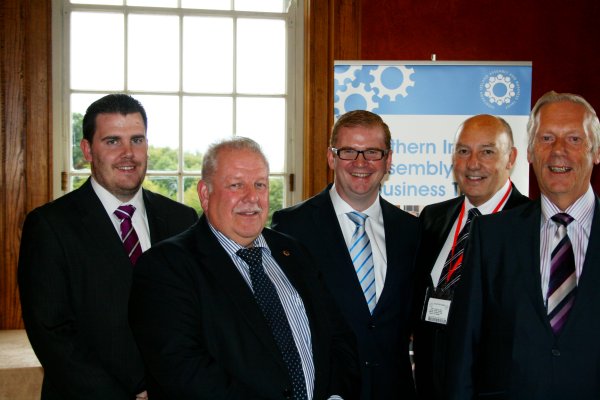
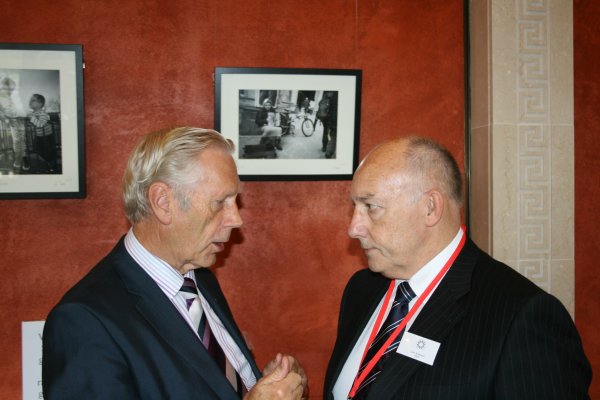
You can read a transcript of the Minister’s briefing here.
The Minister provided a briefing on economic challenges and opportunities that businesses will face in 2013/2014.


You can read a transcript of the Minister’s briefing here.
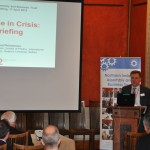 Professor David Phinnemore, Professor of European Politics at the Queens University Belfast was on hand on Tuesday 17 April 2012 to brief members on the recent crisis in the Eurozone.
Professor David Phinnemore, Professor of European Politics at the Queens University Belfast was on hand on Tuesday 17 April 2012 to brief members on the recent crisis in the Eurozone.
The talk focused on some of the key stages on the EU timeline, leading up to the spiralling crisis of December 2009 when Greece signalled debts of €110bn.
The briefing looked closely at how the European Union responded to the Greece debt crisis and the subsequent bailouts required for Ireland and Portugal.
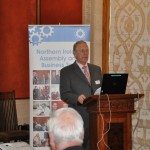 The introduction of the €440bn European Financial Stability Facility (ESFS in May 2010 and the agreement by the European Council to establish a permanent European Stability Mechanism in October 2010 were important initial steps in a bid to safeguard the financial stability of the euro area as a whole.
The introduction of the €440bn European Financial Stability Facility (ESFS in May 2010 and the agreement by the European Council to establish a permanent European Stability Mechanism in October 2010 were important initial steps in a bid to safeguard the financial stability of the euro area as a whole.
There were a number of thought provoking questions from members. They were keen to discover what influence national politics would have on how the crisis is resolved and whether or not economies such as Ireland and Portugal could develop fast enough to actually repay the debt owed. Members were also interested to learn if more and more differentiation of membership could eventually lead to a fragmentation of the union.
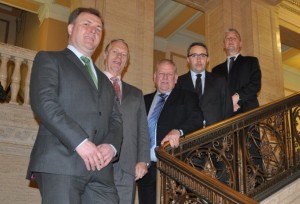 There were of course no easy answers but Professor Phinnemore was keen to point out that a more positive outlook could be on the horizon. He cited the July 2011 Treaty establishing a permanent European Stability Mechanism (ESM) and the adoption in October 2011of the ‘six pack’ of legislative measures on improved economic governance as concrete methods to stabilize the union.
There were of course no easy answers but Professor Phinnemore was keen to point out that a more positive outlook could be on the horizon. He cited the July 2011 Treaty establishing a permanent European Stability Mechanism (ESM) and the adoption in October 2011of the ‘six pack’ of legislative measures on improved economic governance as concrete methods to stabilize the union.
Property was the matter of the day when Members of the NIABT received a briefing on the Northern Ireland property market, with the focus on both the commercial and residential sectors.
Marie Hunt, Executive Director at CBRE and Tom McClelland, Housing Spokesperson at the Royal Institute of Chartered Surveyors were the guest speakers at the March 2012 event.
Marie provided a comprehensive overview of the commercial property outlook for 2012, focusing on occupier, investment, development land and hotel markets. She highlighted issues such as a lack of consumer confidence, decreased credit opportunities for businesses and households and instability in the wider employment market as being contributing factors to the continuing downturn.
It was not all doom and gloom though and Marie did provide plenty of food for thought, particularly in relation to the tourism opportunities of 2012 and the possibility of devolving Corporation Tax to attract FDI.
Tom McClelland noted that many of the factors affecting the commercial sector were just as relevant for the residential side of the market. He did stress though that there are reasons to be cheerful and that the worst does now seem to be behind us – affordability for example is dramatically improved and the numbers of first time buyers are also on the rise.
We caught up with Tom and Marie after the briefing and you can find out more by listening to our audio interviews below: